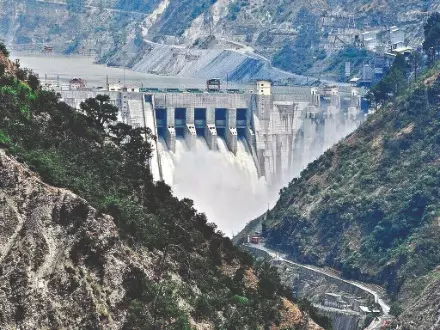India rejects Court of Arbitration ‘ruling’ on two J&K dam projects

New Delhi: India on Friday firmly rejected a “supplemental award” issued by a Court of Arbitration over its competence regarding the Kishenganga and Ratle hydroelectric projects, both situated in Jammu and Kashmir. These projects, part of the Indus river system, have long been a source of contention between India and Pakistan under the framework of the Indus Waters Treaty (IWT).
In a strongly worded statement, the Ministry of External Affairs (MEA) stated that India has never recognised the legality of the tribunal. “Today, the illegal Court of Arbitration, purportedly constituted under the Indus Waters Treaty 1960, albeit in brazen violation of it, has issued what it characterises as a ‘supplemental award’,” the MEA said.
According to the Indian government, the constitution of the tribunal itself contravenes the treaty’s provisions. “India’s position has all along been that the constitution of this so-called arbitral body is in itself a serious breach of the Indus Waters Treaty. Consequently, any proceedings before this forum and any award or decision taken by it are also for that reason illegal and per se void,” the statement added.
The MEA also linked its decision to put the Indus Waters Treaty in abeyance to the terrorist attack in Pahalgam in April, which resulted in the deaths of 26 people. “India, in exercise of its rights as a sovereign nation under international law, has placed the Indus Waters Treaty in abeyance, until Pakistan credibly and irrevocably abjures its support for cross-border terrorism,” the ministry noted.
Reiterating its stance, India said no international body has jurisdiction over its actions under such circumstances. “No Court of Arbitration, much less this illegally constituted arbitral body which has no existence in the eye of law, has the jurisdiction to examine the legality of India’s actions,” it asserted.
Calling the move a “latest charade” influenced by Pakistan, India alleged that Islamabad was attempting to deflect from its record. “This latest charade at Pakistan’s behest is yet another desperate attempt by it to escape accountability for its role as the global epicentre of terrorism,” the statement continued.
Pakistan has raised objections to the hydroelectric projects citing possible disruptions in downstream water flow on the Jhelum and Chenab rivers. India, however, maintains that its activities are within the parameters of the 1960 treaty, which permits run-of-the-river hydro projects on western rivers allocated to Pakistan.
India has also sought to suspend dispute resolution processes related to the projects while reassessing its rights over western river waters under the treaty framework.with agency inputs



